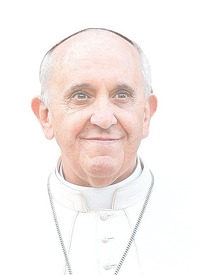
A platform that encourages healthy conversation, spiritual support, growth and fellowship

NOLACatholic Parenting Podcast
A natural progression of our weekly column in the Clarion Herald and blog

The best in Catholic news and inspiration - wherever you are!
Pope: Martyrs witness to the power of love
-

Martyrdom is primarily an act of love, not heroism, and while it often comes in the midst of persecution, it should motivate Christians to seek peace and reconciliation, Pope Francis said.
Persecution and martyrdom are not a thing of the past, he told people at his weekly general audience April 19. “Today there is persecution of Christians in the world. A lot. There are more martyrs today than there were” in the first centuries of Christianity.
As part of his series of talks about “zeal” for evangelization, Pope Francis spoke about the witness of “the host of martyrs – men and women of every age, language and nation – who have given their life for Christ.”
“The martyrs, in imitation of Christ and with his grace, turn the violence of those who refuse the proclamation (of the Gospel) into a supreme occasion of love, which goes as far as forgiving their persecutors,” the pope said. “This is interesting: martyrs always forgive their persecutors. Stephen, the first martyr, died praying, ‘Lord, forgive them, they don’t know what they are doing.’ Martyrs always pray for their persecutors.”
To illustrate his point about modern martyrdom, Pope Francis drew attention specifically to Yemen, “a land that has for many years been afflicted by a terrible, forgotten war, that has caused many deaths and still causes many people, especially children, to suffer today.”
Out of a population of about 31.6 million people, the Vatican estimates the number of Catholics in Yemen to be about 1,000.
In a situation of war and dire poverty, Pope Francis said, “there have been shining witnesses of faith, such as that of the Missionaries of Charity. They are still present today in Yemen, where they offer assistance to elderly who are sick and to people with disabilities. They welcome everyone, of any religion, because charity and fraternity have no boundaries.”
The sisters’ witness of love to others has cost them dearly, though. The pope reminded the crowd that three of the sisters – Sisters Aletta, Zelia and Michael – were “killed by a fanatic” in July 1998 as they were returning home from Mass.
“More recently, shortly after the beginning of the still ongoing conflict, in March 2016, Sister Anselm, Sister Marguerite, Sister Reginette and Sister Judith were killed together with some laypeople who helped them in their work of charity among the least,” the pope said.
The dozen laypeople included “some Muslim faithful who worked with the religious sisters,” he said.
“It moves us to see how the witness of blood can unite people of different religions,” he continued. “One should never kill in the name of God, because for him we are all brothers and sisters. But together one can give one’s life for others.”
Pope Francis prayed that Christians would “never tire of bearing witness to the Gospel, even in times of tribulation.”
“May all the martyr saints be seeds of peace and reconciliation among peoples for a more humane and fraternal world as we await the full manifestation of the kingdom of heaven when God will be all in all,” the pope said.
* * *
Commemorating 10 years since Pope Francis’ election, the Vatican will physically represent the teachings of his encyclicals at the Venice Biennale international architecture exhibition May 20 to Nov. 26.
The Vatican’s exhibit, titled “Social Friendship: Meeting in the Garden,” will take visitors through scenes in which person-like “figures,” holding their arms open in welcome and acting out scenes of dialogue, convey themes inspired by the encyclical “Fratelli Tutti, on Fraternity and Social Friendship.”
The exhibit will then lead to a garden constructed of reused materials with plots growing vegetables from different parts of the world, chicken coops, seed storage facilities and rest areas. The space is intended to be one of contemplation and represent Pope Francis’ ecological encyclical “Laudato si’, On Care for Our Common Home.”
Part of the exhibition will feature work by Portuguese architect Álvaro Siza, recipient of the 1992 Pritzker Prize, which is widely considered to be the highest honor in the field of architecture.
At a news conference presenting the exhibit April 18, Cardinal José Tolentino de Mendonca, prefect of the Dicastery for Culture and Education, said the Vatican’s involvement in the exhibition is an “extraordinary opportunity” since architecture is a “practical laboratory of the future, not far from typically spiritual questions.”
The Vatican’s exhibit is both an “intense political and poetic declaration about what a meeting between human beings can become,” he said, and it “puts all living things in architecture, making us all jointly responsible for our common home.”
“Over the 10 years of his pontificate Pope Francis has acted and spoken on involving all, without forgetting the peripheries, the poor and refugees,” said Cardinal Tolentino. “This already constitutes a great legacy for the future of all those who desire a world that is more just and less wounded by social inequalities, and that is evident in the two parts of the Holy See’s pavilion.”




